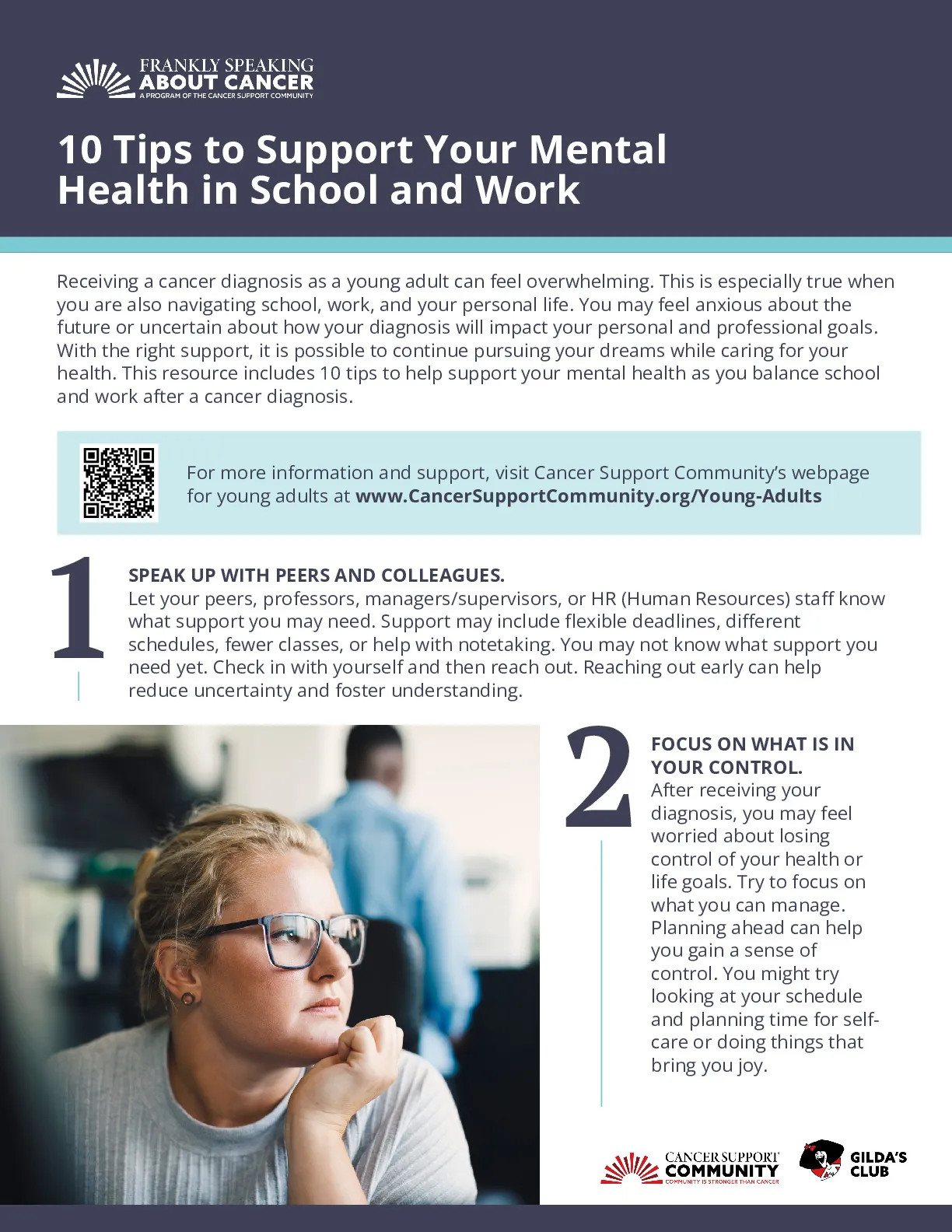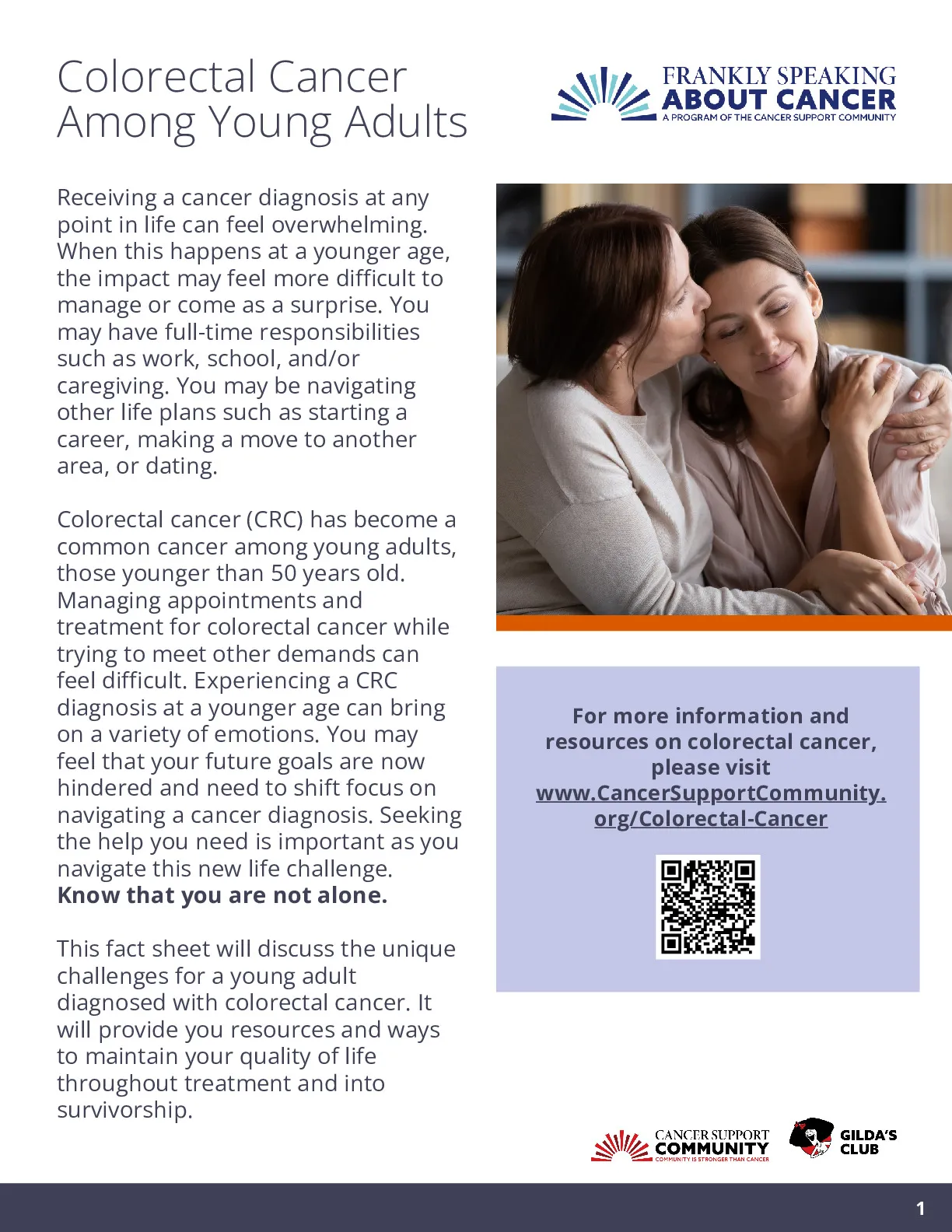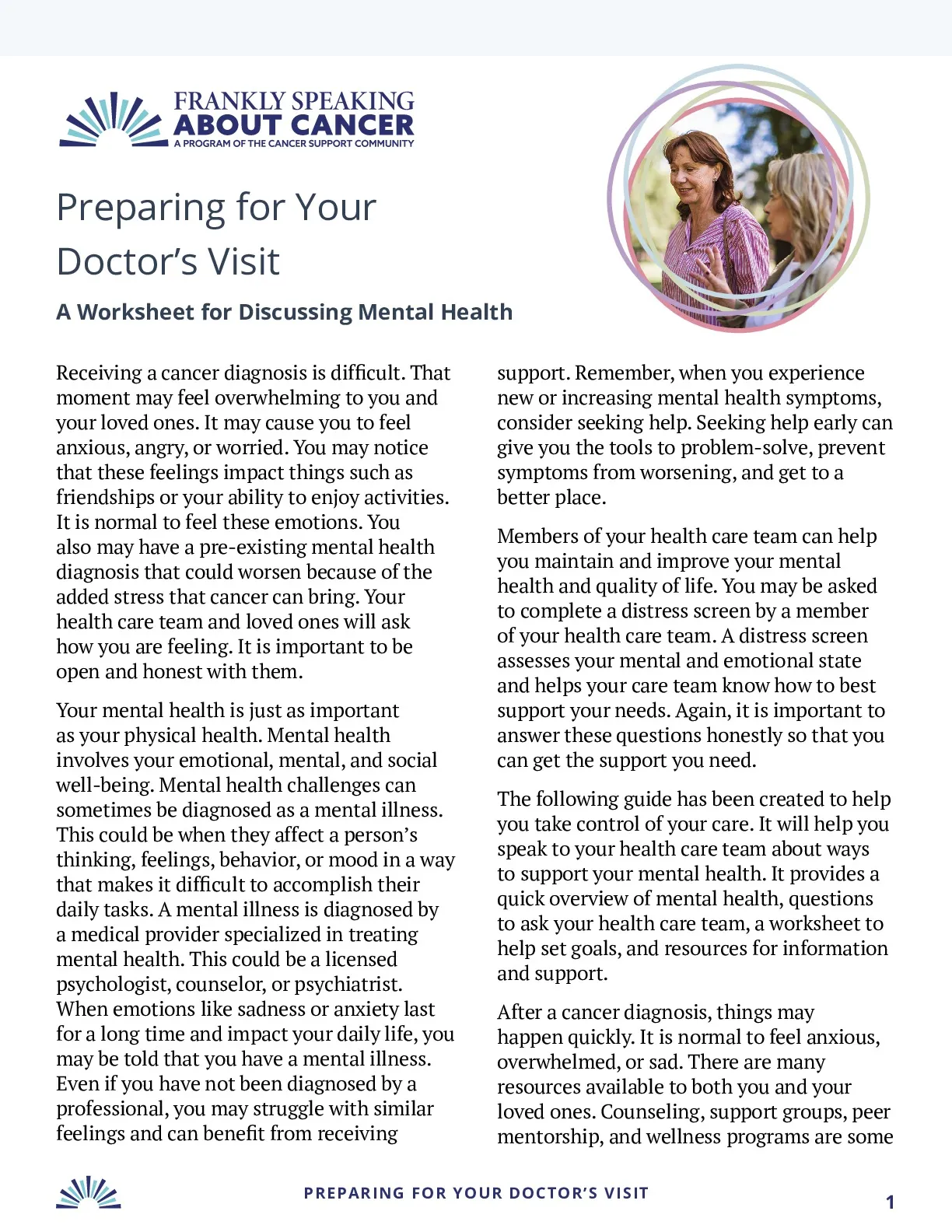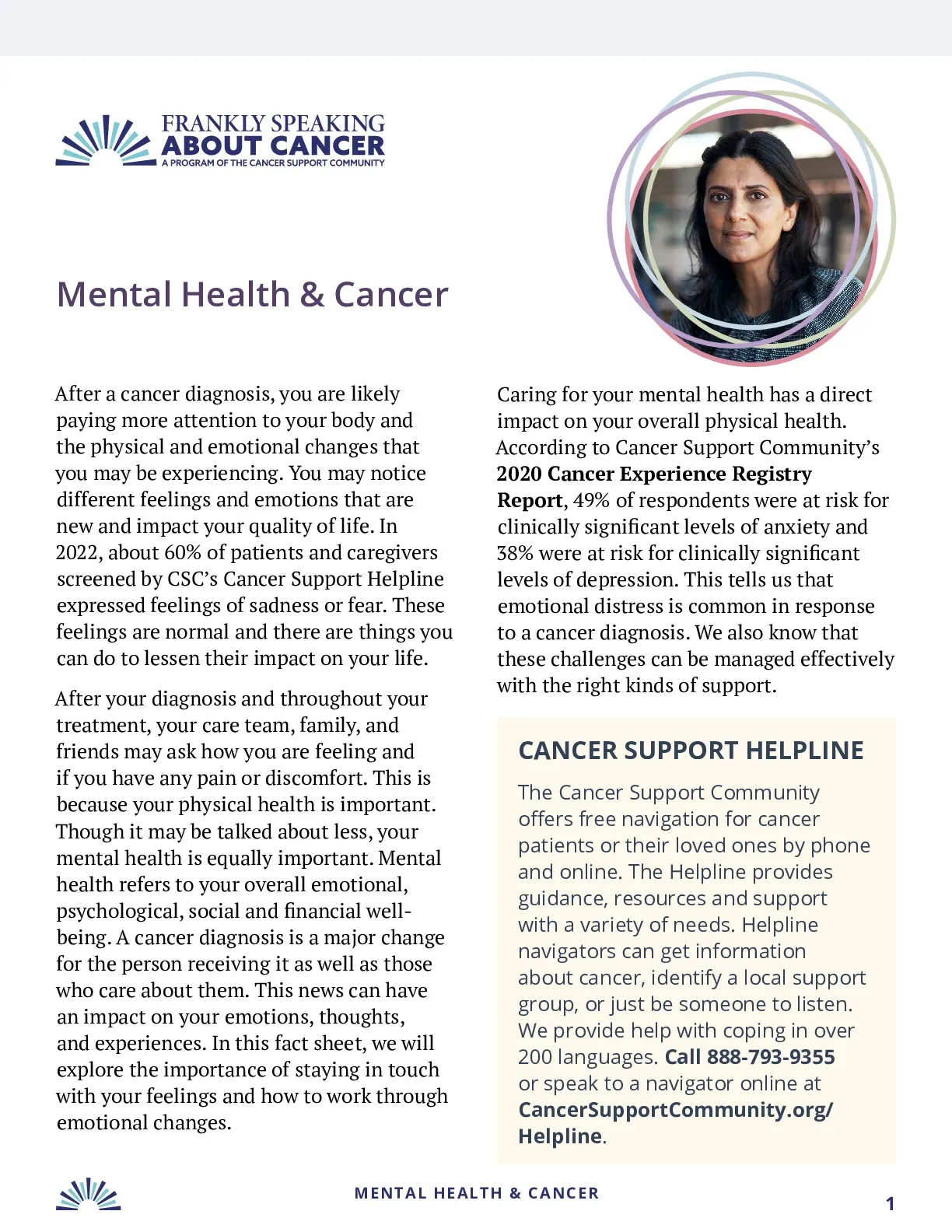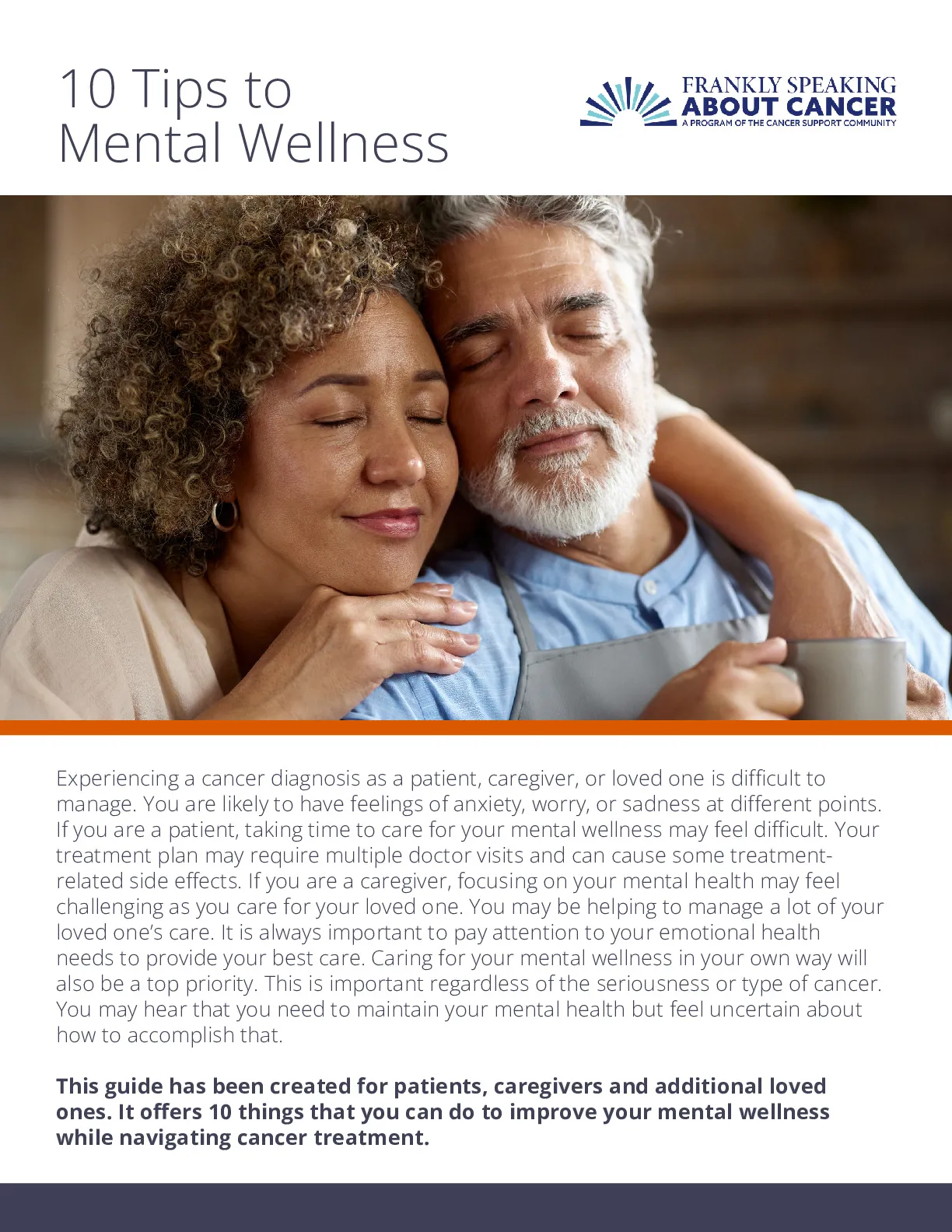Young Adults
Table of Contents

Young adults with cancer (also called YAs) face unique challenges. Generally, YAs range in age from 18 to 45 years old. It’s a pivotal time in life, often marked by major milestones and life transitions. News of a cancer diagnosis can seemingly come out of the blue, just as YAs are pursuing their life paths and dreams, exploring education or career goals, starting a family, or venturing out on their own. A diagnosis can quickly disrupt those plans.
If you are living with cancer as a young adult, it’s important to know there are a variety of resources and programs available to help you cope, find support and connection, and feel understood. They can be helpful tools at any point in your experience, whether you are coping with news of a diagnosis, navigating treatment, managing a recurrence, or transitioning to survivorship.
Coping Strategies
Mental Wellness
You may be feeling a roller coaster of emotions as you cope with your cancer diagnosis. Know that you’re not alone. It’s normal for YAs — and people of all ages — to experience a wide range of feelings after a diagnosis, during treatment, and in post-treatment survivorship.
Emotions may include feelings like:
- Anxiety, sadness, or depression
- Nervousness or fear
- Loneliness or isolation
- Concerns about how you look
- Worries about a recurrence
Many emotions fade over time. However, some emotions may develop into clinical depression, intense anxiety, or panic. It’s important to check in with yourself regularly and seek professional support if you notice prolonged feelings like sadness, depression, or anxiety.
You can’t cope with your life unless you are resilient. You have to grieve — that is what makes us people. But to keep going is resilience in the face of something terrible going on.
Note: Mental health stigma can prevent some people from talking about their cancer experiences and seeking the mental health support they need. Try to set aside any doubts you have about mental health treatment and give it a try. Talk with a counselor, therapist, or other mental health professional, and then decide if it could be helpful to you.
Learn more about mental health and cancer:

Breathe & Stretch
Try one of our yoga lessons, gentle exercises, or meditations to keep you moving & breathing.
Life Changes
Living with cancer and transitioning to life post-treatment requires adjustment for people of all ages. For young adults, it can be especially challenging to find a “new normal” when life may feel very different than it did before their cancer diagnosis.
Young people may find it hard to navigate life changes such as:
- Resuming life plans
- Returning to work or school
- Reconnecting or keeping up with peers
- Dealing with the long-term financial impact of treatment
Some changes may be temporary, while others may be more long-lasting. You may worry about how these changes impact other people in your life. It’s important to communicate with your loved ones about how you are feeling and what you are thinking. It could also be helpful to join a local cancer support group for YAs who may be facing similar life changes and experiences.
Talking to others who have navigated [similar] challenges can help to normalize your feelings and provide ideas for how to find your new normal.
Dating With Cancer
Worried about dating after cancer? Ruby, your virtual community navigator, discusses the universal challenges and worries for young adults with cancer as well as tips on dating and how to ask for help. The Cancer Support Community is here to support…
Side Effects
People with cancer can experience side effects during their treatment and even after treatment ends. While everyone’s experience is unique, young adults may be more likely to experience long-term cognitive effects of chemotherapy and radiation compared to older adults. Cognitive effects can include changes to a person’s memory or concentration.
Other long-term side effects may include:
- Fatigue
- Sleep changes
- Lymphedema (pain and swelling in the arms, legs, or trunk)
- Neuropathy
- Loss of fertility or fertility problems
Everyone experiences treatment and side effects differently. Some people may have minimal side effects, and others may experience many. Side effects are often considered a physical concern, but they can also affect people’s mental health and well-being.
It’s important to let your care team know if you are experiencing any side effects, during your treatment or beyond, so that you can work together to manage these side effects and create solutions.
Survivorship Care
Alyssa, a 2-time pediatric cancer survivor, shares strategies that help her cope in her 30s with late effects like “brain fog” and fatigue.

Support & Connection
As a YA, having access to support throughout your cancer experience is vital for your emotional and mental health. We are here for you every step of the way with free resources to address your unique needs:
Reach Out to Our Helpline
Our Cancer Support Helpline provides free, personalized navigation for cancer patients and their loved ones, including access to a questionnaire to determine your needs for support and resources.
The Helpline team also offers specialized navigation to assist people with specific issues. Our Financial specialist, for example, can offer guidance on financial issues related to cancer and provide referrals to resources that may help with cancer-related treatment expenses.
Reach out to our team by phone or connect with us online via our chat service.
When you need a warm, understanding voice, just reach out to our Helpline to call or chat. We are here to listen and assist. Together we can figure out the best resource or next steps.
Young Onset of Colorectal Cancer
Join Colorectal Cancer Alliance (CCA) and Cancer Support Community (CSC) for a talk with a Colorectal Cancer Nurse Practitioner and survivor discussing the unique considerations and experience of receiving colorectal cancer diagnosis at a younger…
Build Your Online Community
Find inspiration and connection in our free digital support community, MyLifeLine, for people impacted by cancer. Meet others like you on our discussion forums and create a personal support network site to join your family and friends together.
Join the Conversation
Connect with other YAs living with cancer or navigating survivorship on our Cancer in Your 20s–30s forum, and explore other forums covering topics like Nutrition & Wellness and Coping With Side Effects. Moderated by licensed mental health professionals and available 24/7, our forums are a safe space to share your experiences and learn about others' experiences.
Set Up a Personal Network Site
Invite your family and friends who care about you most to help you regain control, follow your experience, and provide social, emotional, and practical support throughout your treatment process and beyond.
- Document your cancer experience on the interactive blog.
- Organize events and volunteers on the Helping Calendar.
- Assign Care Coordinators to help manage your site.
Find Support Near You
We have 196 CSC and Gilda’s Club locations worldwide, with professionally led programs that include support groups, yoga classes, and educational workshops designed to assist patients, caregivers, and loved ones — in person and online. Programs are offered at no cost to anyone impacted by cancer.
Become a Cancer Advocate
Advocacy is a way the young adult cancer community can:
- Share unique concerns and experiences among YAs
- Influence public policy
- Advocate in support of a cause
- Encourage progress toward solutions
Your voice is essential to help policymakers understand what is important to young people living with and beyond cancer and to their loved ones.
Remember that your voice and your story matter, especially when connecting with your elected officials. They represent you, they serve you, and they will listen to you.
Programs for YAs
Thanks to a growing awareness and understanding of the unique challenges young adults face in their cancer experience, more and more support programs are being designed to specifically address the needs and concerns of YAs. Find a program that meets your needs and preferences.
Cancer Transitions for Young Adults
The Cancer Transitions for Young Adults program is a 4-week, manualized program led by a facilitator and designed to help post-treatment cancer survivors move into the next phase of life with skills and strategies to live fully.
The program covers core issues for young adult cancer survivors, including physical, social, emotional, and practical issues young adults may face as they navigate a new stage of their cancer experience — survivorship. Young adult survivors who wish to better manage the short- and long-term impacts of cancer, especially within the first few years after active treatment, will gain valuable skills through this program.
How to Get Started
If you’re a YA survivor, contact your nearest CSC or Gilda’s Club location to ask if a Cancer Transitions program is offered and when. If you don’t have a location near you, contact our Helpline for assistance. We may be able to connect you to a location where a virtual Cancer Transitions program is being offered.
You are just going through the emotions of treatment and [then] you are kind of like, ‘Now what?'
Other YA Programming
Some cancer support organizations focus specifically on creating no- or low-cost opportunities for young adult survivors to connect with others, both in person and virtually.
Helps teens and YAs with cancer build a peer community.
Provides online support programs to Young Adult (YA) cancer survivors and caregivers, including a monthly video “hang out.”
Organizes life-changing outdoor adventures for YAs.
Provides both digital and in-person opportunities for adolescent and young adult cancer patients, survivors, and their loved ones to connect.
Provides various opportunities for young breast cancer survivors to connect both online and in person.
What Helps You Cope?
Share your story to let other YAs know they are not alone. There are so many ways your story can help other young people living with cancer.
